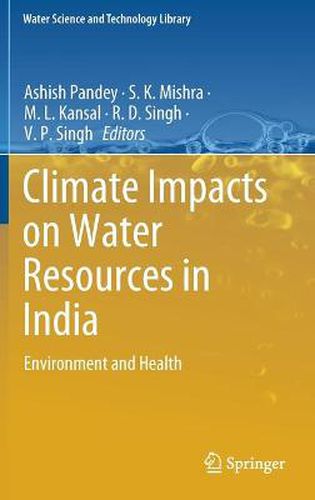Readings Newsletter
Become a Readings Member to make your shopping experience even easier.
Sign in or sign up for free!
You’re not far away from qualifying for FREE standard shipping within Australia
You’ve qualified for FREE standard shipping within Australia
The cart is loading…






This title is printed to order. This book may have been self-published. If so, we cannot guarantee the quality of the content. In the main most books will have gone through the editing process however some may not. We therefore suggest that you be aware of this before ordering this book. If in doubt check either the author or publisher’s details as we are unable to accept any returns unless they are faulty. Please contact us if you have any questions.
This book chiefly focuses on environmental flow, water pollution and water quality. Several chapters also cover water treatment technologies and management. In today’s context, climate change and climate variability are important issues in the water sector, which is called upon to develop adaptation strategies to cope with their negative impacts. Human health depends upon the quality of water used for drinking and irrigation purposes. These core issues are discussed and addressed in several chapters.
The book explores the impact of climate change on water resources and considers various climatological scenarios. In this regard, it carries out a trend analysis and compares the performance of various Global Climate Models (GCMs). Further, it conducts a water quality analysis and water quality mapping so as to provide information on the most vulnerable areas in the context of water quality. Emerging pollutants, generated from paper mills, are identified in order to choose an appropriate treatment technology. Bioremediation techniques are included for the characterization of improved water quality parameters. The book also presents a low-cost treatment technology for fluoride removal, which can help water managers ensure potable water to stakeholders. In terms of maintaining river ecology in the downstream areas of water resources project sites, the book provides a number of case studies on assessment of environmental flows. Advanced treatment technologies that can be highly advantageous for removing water pollutants are presented.
Given its scope, the book offers a valuable resource for academics, water resources practitioners, scientists, water managers, environmentalists, administrators, NGOs, researchers and students who are involved in water management with a main focus on water pollution, the environment, climate change and health.
$9.00 standard shipping within Australia
FREE standard shipping within Australia for orders over $100.00
Express & International shipping calculated at checkout
This title is printed to order. This book may have been self-published. If so, we cannot guarantee the quality of the content. In the main most books will have gone through the editing process however some may not. We therefore suggest that you be aware of this before ordering this book. If in doubt check either the author or publisher’s details as we are unable to accept any returns unless they are faulty. Please contact us if you have any questions.
This book chiefly focuses on environmental flow, water pollution and water quality. Several chapters also cover water treatment technologies and management. In today’s context, climate change and climate variability are important issues in the water sector, which is called upon to develop adaptation strategies to cope with their negative impacts. Human health depends upon the quality of water used for drinking and irrigation purposes. These core issues are discussed and addressed in several chapters.
The book explores the impact of climate change on water resources and considers various climatological scenarios. In this regard, it carries out a trend analysis and compares the performance of various Global Climate Models (GCMs). Further, it conducts a water quality analysis and water quality mapping so as to provide information on the most vulnerable areas in the context of water quality. Emerging pollutants, generated from paper mills, are identified in order to choose an appropriate treatment technology. Bioremediation techniques are included for the characterization of improved water quality parameters. The book also presents a low-cost treatment technology for fluoride removal, which can help water managers ensure potable water to stakeholders. In terms of maintaining river ecology in the downstream areas of water resources project sites, the book provides a number of case studies on assessment of environmental flows. Advanced treatment technologies that can be highly advantageous for removing water pollutants are presented.
Given its scope, the book offers a valuable resource for academics, water resources practitioners, scientists, water managers, environmentalists, administrators, NGOs, researchers and students who are involved in water management with a main focus on water pollution, the environment, climate change and health.